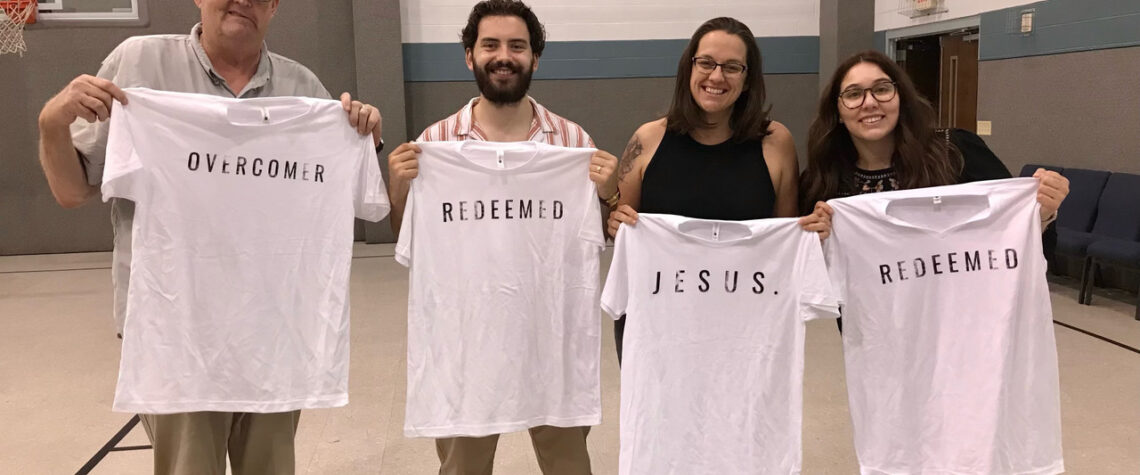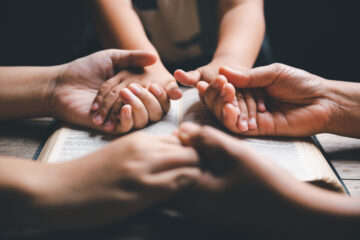At the ’24 Golden Globes, the comedian Jim Gaffigan made a joke heard ‘round the online world. “I can’t believe I’m in the entertainment industry. It’s so unlikely,” he began in his usual, sarcastic, and slightly bewildered way, “I’m just a guy from a small town in Indiana. I’m not a pedophile.”
The infamous Epstein client list was released 5 days earlier. In a room filled with A-list celebrities, Gaffigan’s joke earned a mid-level laugh.
What world do we live in where the people lauded as the most beautiful, most talented, or the funniest, can joke like this and find it funny? And when a film like “The Sound of Freedom” (a “based on a true story” movie about human trafficking) has breakout success, those same people slap inflammatory titles on it. Or say nothing at all.
Victims of sexual abuse and human trafficking are not entertainment fodder for Hollywood. Men and women, and boys and girls of all ages can be and are being affected.
But what exactly is human trafficking? It is not synonymous with sex trafficking, but they often happen together. Sex trafficking is forcing or coercing someone to participate in sex acts for money. Human trafficking is forcing or coercing someone into debt bondage, peonage, slavery, or involuntary servitude.
This second crime is more prominent in poorer countries where families often pull their children out of school to help the family earn enough money to survive. Children are sold with the belief they will be able to go home. Instead, they are forced to work 16 hours a day in factories and on farms you wouldn’t want to step foot in.
Some of the products these children make are probably in your home right now. Have a Hershey, Mars, or Nestle product? Many Western African farms have young children wielding machetes to extract cocoa beans from their pods. And you know that awesome new top you got online for super cheap? Companies who can sell things at those prices aren’t paying fair wages somewhere in their production line. Children are cheap, submissive laborers.
But this can change, and you can be part of it. More organizations now exist to give you opportunities to help fight these atrocities. Right here in Nashville, Tennessee, Rescue 1 Global is doing exactly that.
Founded in 2011 by missionaries Daniel and Lacy Henson Tolar, Rescue 1 Global is an independent, full-scale prevention, rescue, and restoration mission to fight human-trafficking locally and around the world. It was during a 2011 mission trip to Thailand, a hotspot for human trafficking, that the Tolars’ eyes were opened.
And as we all know, once God shows you something, you can’t look away. So the Tolars did as Jesus commanded, they became His hands and feet. They found Thai Christians whose hearts God had also softened, and they got to work. Then God showed up again. Others were moved by their work, and what started in Thailand eventually grew into the Philippines, Loas, and India.
When the Tolars came back to Nashville, they were ready to rest, but their eyes couldn’t be shut. As they soon discovered, human trafficking wasn’t a third-world problem, it was an everywhere problem, even in the buckle of the Bible belt. So, once again, the Tolars rolled up their sleeves and got to work.
Over the last 12 years, Rescue 1 has saved 847 people from this darkness. That’s easy to read and gloss over. “Glory to God!”, “Yes!”, “Hallelujah!”, and “Amen,” we all say. We should rejoice, but we should also realize this is not a somewhere else problem. Human trafficking is happening everywhere, and the problem is growing.
But such a sinful and horrible thing could never happen where you live, surely?
Sadly, yes.
Jonathan Williams is Rescue 1’s current Board Chair and an ardent volunteer. He connected with Daniel and Lacy in 2020. During the pandemic, the Nashville mayor’s office got in touch with Rescue 1 to ask for help. They had moved many of the homeless community into a local motel to curb COVID cases. What they soon discovered was rampant prostitution, and they didn’t know what to do. Rescue 1 asked Jonathan’s church for help and he never looked back.
But that’s Nashville. It’s urban. That would never happen in the suburbs…
Over the phone, Jonathan told me of a girl in the Brentwood public school system whose uncle would pick her up at 1 AM, sell her for a few hours, then take her home. For years, her parents were clueless until a DCS worker reached out to Rescue 1 for help. The girl’s parents didn’t believe them, so Rescue 1 gathered evidence. When the uncle found out, he fled to his home country and the girl’s trafficking stopped. When the uncle flew into Atlanta 2 years later, he was promptly arrested. Thank God.
More recently, Jonathan was having breakfast at First Watch in Cool Springs. He saw a teenage girl with an older woman outside near a car and felt the Holy Spirit’s prompting. He went outside and saw the girl sell herself to the man in the car.
Further south in Spring Hill, Jonathan knew a local girl who, several years after her high school graduation, ended up with a drug addiction and a 6-figure debt to her dealer. About this, Jonathan said, “The dealer let her try to work off the debt. Surprisingly, within 3-4 years, she did. But there were days [when we were doing community outreach] when I saw her get into 3-4 cars in an hour.” The sad part? Jonathan knew her parents, knew they would take her back in a heartbeat, but she wouldn’t accept Rescue 1’s help. Victims often see themselves as too broken to be redeemed. “But we’re out there to love them and share the gospel. We can’t save them, only the Holy Spirit can,” he added.
But drugs aren’t the only gateway to being trafficked or abused.
“Parents think their kids are safe because they lock their phones. They’re not,” Jonathan adds. Because he knows of a girl whose phone was locked down, but someone hacked in and started sending her friendly messages. Eventually, the hacker asked for photos. Though nothing explicit was shared, the only reason it stopped was because the girl’s father heard her phone go off in the middle of the night and saw the messages.
Jonathan has seen trafficking victims throughout Nashville and even into Columbia, but sex trafficking has happened in all 95 Tennessee counties.
In 2023, according to the Tennessee Bureau of Investigation’s report, there were over 600 reported cases of minor (under 18) sex trafficking in Tennessee. That was 10 times the amount from 2017, and the vast majority are reported by social services workers. In the same report, the TBI acknowledged they had received tips for minor sex trafficking for children as young as 5 months. The average age for sex trafficking victims in Tennessee is 13-17, in line with the national average.
But these trends don’t have to get worse. We can pray, as we all should, but we can also help. You don’t have to join law enforcement and wear a badge every day, but you can help prevent, help rescue, or help restore.
Rescue 1 offers all 3 services to victims of human trafficking, and anyone can get involved. Really. The first step to stopping this crisis is prevention. Rescue 1 offers community awareness training through their Human Trafficking 101 program. Learn how the trafficking industry works, how to recognize potential victims, which authorities to notify, and steps you can take to prevent another victim.
But in today’s digital age, with children having unlimited access to strangers and information, Rescue 1 also offers a Kids Rescue Kids program. Our children see more than we think they do. Let’s give them the tools to think about what they see.
The second step is rescue. Admittedly, this is not for everyone, but those to whom God has given the courage, listen up. Rescue 1 has a “Special Ops” team with 3 divisions: community outreach, surveillance, and mobile ops teams.
Outreach teams, like the one Jonathan serves on, get to know traffickers and their victims through repeated contact. When asked, Jonathan insists it is much safer than we might believe. Groups go out in 3-4, usually with armed protection. But the victims know the faces of the outreach teams. They look forward to seeing them because they offer home-cooked meals and hygiene products.
“But,” he adds, “we would love to have more women on the outreach teams. Women get a completely different response than men do. They’re treated more warmly and people will tell them things they won’t tell men, because we look like the people they’re being trafficked to.”
Surveillance teams can liaise with law enforcement by providing security, being part of the outreach teams, finding “business” locations, or gathering information.
Mobile Ops teams get the victims out or help relocate them. Rescue is most often needed overseas, and can be asked for by law enforcement, district attorneys, medical and social workers, or even the victims. “We don’t kick down that many doors though. So many guys want to kick down doors, but that’s about 1% of the time,” Jonathan quips. “It’s not Jim Caviezel running through the jungle.”
The third step is restoration. Arguably, the most important, but the most difficult stage to get victims to.
“It’s incredibly frustrating, but so often we talk to people who promise to meet us next week [to get on the bus to rehab] because they want to go get high one more time. When they do that, I know they won’t show up,” Jonathan notes.
Don’t they want to get away from that life?
For too many, getting high and being sold is all they know. They don’t have Christmas celebrations or small groups. Victims of sex trafficking tend to see themselves as worthless. When your body is sold for pleasure, why would you believe anyone cares about the soul inside it?
But for those who accept Rescue 1’s help and are moved to rehab or a safe house, the biggest need is for people to love on these women and/or are willing to host a Bible study. You don’t have to be Franklin Graham or Lisa Turkeurst, just willing to answer God’s call.
Even if your schedule is full, consider donating old clothing, canned food, or feminine hygiene products. (Especially that last item.) If you know of a group willing to cook, donating homecooked meals is the key to gaining these victims’ trust.
But keep this in mind, according to Jonathan: “A lot of places donate pasta, but these people want real, homecooked food. Who doesn’t? When we show up with casseroles or burgers with mashed potatoes, they line up to talk to us.”
One of Rescue 1’s board members, so Jonathan tells me, has a large grill and will spend a few hours grilling over 100 burgers for the outreach teams to hand out.
If you manage to burn even rice, there’s also a need for people to help box up food for the outreach teams.
If your time is slim, but your wallet is blessed, money is the easiest way to sustain Rescue 1. You can buy Rescue 1 merchandise, everything from art to mugs to candles to hats. You can join the prayer team and fight on the spiritual front as well.
But whatever you do, don’t look away. Human trafficking is only getting worse. Right now, as many as 50 million people are enslaved globally. This industry is estimated to bring in $150 billion dollars a year, right behind the drug trade. And its biggest consumer? The United States.
Hollywood thinks it can afford to laugh this off because we continue laughing, continue watching, continue singing along. Laughing isn’t bad, and neither is a good show, but if you want to support Rescue 1 and have a good time, join their “Rise to Freedom: Music & Comedy Show” on February 29th, 2024, at Thompson Station Church in Thompson Station, TN. Doors open at 5:30 P.M and show starts at 6:30 P.M. Performances will feature the talented Carson Peters, a contestant from “The Voice”, and the hilarious comedian Paul Aldrich. General admission tickets are $40, VIP is $75. If you’d rather cheer from the comfort of your home, streaming access tickets are only $20.
Edward Everett Hale once said, “Because I cannot do everything, I will not refuse to do the something that I can do.”
So…what can you do?
Megan Wilson













